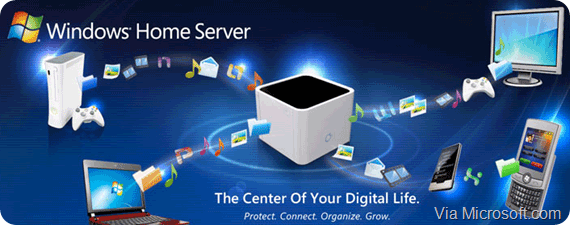Do you have a computer for the kids, for yourself and one you use for work? What about an iPad or video streaming device like an Apple TV? If the answer to these questions is yes, chances are that you have movies, music, family videos, pictures and documents scattered around all of these devices without control or a backup system in place.
In the situation above, a NAS (Network Attached Storage) or a Windows Home Server would do the trick. As the title of this post suggests this series is about implementing a Windows Home Server solution and not a NAS solution. In case you were wondering here are a couple of reasons why.
- There are limits to the device’s functionality due to pre-installed hardware and software.
- An extra $100-$150 will fetch a decent Windows Home Server.
- Backup software is basic.
- Limited or no link between user accounts on Windows PC and NAS device.
Eventually I will write about setting up a NAS at your home or office, but for this guide we will stick to the Windows Home Server solution.
5 Reasons You Need a Windows Home Server
1. Media Sever – With a Windows Home Server at home you can store and organize all of your digital media in one central location and you can stream that content to other devices on your network.
2. Backup and Data Recovery – Let’s face it, most of us do not have the time or patience to make sure that all of the computers in our household have fresh backups at all times. Even if we did who wants to deal with restoration applications that can be completed or out of date? Windows Home Server makes data recovery a simple process.
3. Document Management and Remote Access – Did you forget an important document at home? Do you want to share your family pictures with friends while vacationing? Windows Home Server’s document management and secure remote access features make accessing files from any location as easy as visiting a website.
4. Extensibility – One of the most powerful features of Windows Home Server is the ability to extend its basic functionality to activities like home security, nanny cams, home control and automation, and much more.
5. Small Business Friendly – If you run an office with 10 computers or less then you might want to consider using a Windows Home Server to share files, control directories, and keep your small business running should disaster strike.
What Does a Windows Home Server Cost?
It depends. You have two options when purchasing a Windows Home Server: you can buy one from manufacturers like HP, Lenovo, Asus and Acer or you can build one yourself. I will cover both options in upcoming articles.
If you purchase a Windows Home Server from one of the aforementioned manufacturers, you will find that prices range from $279 for an Atom powered 500GB Mini SOHO Home Server from Asus – all the way to $849 for a 3TB StorageWorks X510 Data Vault from HP. However if you decide to build a server or repurpose an old computer as a Windows Home Server you can probably get below the $279 for a custom-built home server. The option is yours and I’ll help you make that decision.
Next Steps
In the following guide, we will explore the option of buying a Windows Home Server from the manufacturers above. I will gather information on each of the devices including; price, reviews, capabilities, and more so stay tuned for next week’s edition of the Weekend Project.
Start thinking about all of the content you have and look around for that old PC which might save you a couple of hundred dollars.




